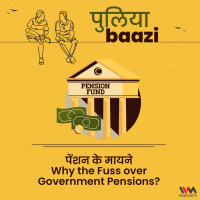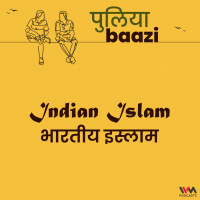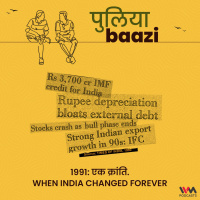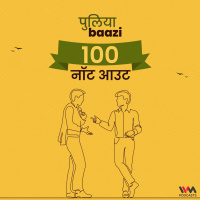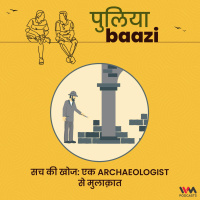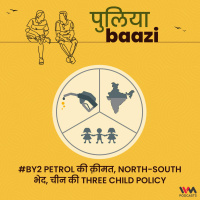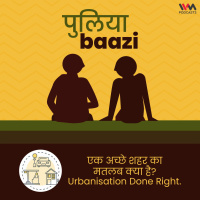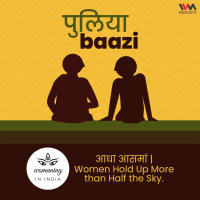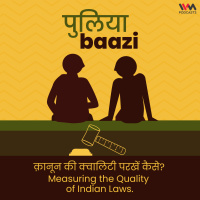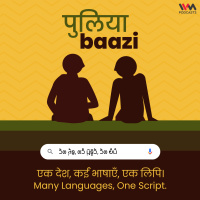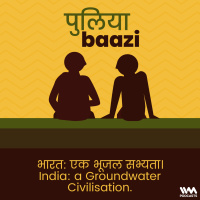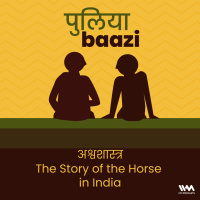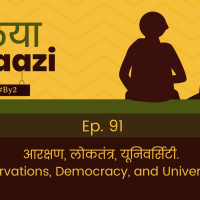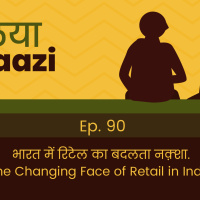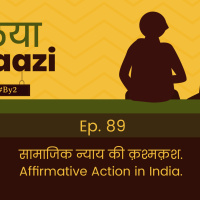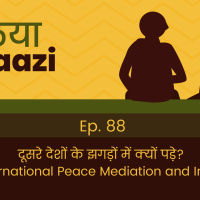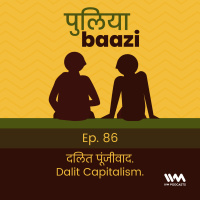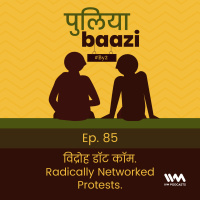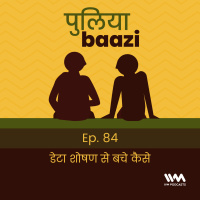Informações:
Sinopse
Podcast by Pranay Kotasthane and Saurabh Chandra
Episódios
-
पेंशन के मायने. Why the Fuss over Government Pensions?
09/09/2021 Duração: 01h26minएक पेंशन का हमारे पॉपुलर कल्चर में बड़ा महत्व है। बुढ़ापे में पेंशन का आश्वासन एक बड़ा कारण है जिसकी वजह से हर सरकारी नौकरी के लिए आवेदकों की भीड़ उमड़ पड़ती है। तो पेन्शन - ये संकल्पना आख़िर शुरू कब से हुई? सरकार कम्पनियों पर पेन्शन देना बाध्य क्यों करती है? भारत में कितने प्रकार के पेन्शन है? आगे जाकर ये पेन्शन क्या रूप धारण कर सकते हैं? ये One Rank One Pension (OROP) है क्या? ऐसे कुछ सवालों की मदद से हमने पुलियाबाज़ी की अर्थशास्त्री रेणुका साने के साथ। रेणुका पेंशन फाइनेंस में महारथ रखती है। इस एपिसोड में उन्होंने सरकारी पेंशन प्रणाली का विस्तार में ब्यौरा दिया है। The word “pension” is synonymous with old-age security. After the second world war, the scope and reach of this financial instrument have expanded all over the world. But does this mechanism make sense in the new economy? What are the pension schemes that the Government of India runs? Can the Indian government afford a scheme like One Rank One Pension (OROP)? In this episode, economist Renuka Sané (@resanering) discusses the economics of pensions in d
-
भारतीय इस्लाम. Indian Islam.
26/08/2021 Duração: 01h41minआये दिन ऐसा लगता है सांप्रदायिक मन-मुटाव बढ़ता जा रहा है। हिन्दू-मुसलमान पुलियाबाज़ी सिर्फ बयानबाज़ी रह गयी है। तो इस बार हमने बात की लेखक और सम्पादक ग़ज़ाला वहाब (@ghazalawahab) से जिनकी नयी किताब Born a Muslim भारतीय इस्लाम पर रौशनी डालती है और कई मनघडंत धारणाओं को ख़ारिज करती है। Tolerance between religions has been a defining value of Indianness. And yet, this sentiment has been shaken in recent years. WhatsApp groups are flooded with forwards spreading blatantly false narratives with an intent to communalize Indian society. So in this episode, we speak with author Ghazala Wahab about her latest book Born a Muslim. Ghazala discusses Indian Islam and busts many myths that have flourished because of declining contact between communities. For more:Ghazala Wahab’s book Born a MuslimInfluence of Islam on Indian Culture, book by Tara ChandA History of the Arab Peoples, book by Albert HouraniGhazala’s Manthan talk on YouTubeEp. 53: सीएए और एनआरसी: इंसानों का डिमॉनेटाईसेशनPuliyabaazi is on these platforms:Twitter: htt
-
1991: एक क्रांति. When India Changed Forever
12/08/2021 Duração: 01h40min१९९१ में भारत में एक सामाजिक और आर्थिक क्रांति आई। आर्थिक सुधारों ने 25 करोड़ भारतियों को गरीबी से निकाला और भारत को विश्व भर में एक नयी पहचान दी। इस क्रांति को आए पिछले महीने ३० साल हो गए। तो इसी विषय पर पुलियाबाज़ी करने लौट रही है अर्थशास्त्री श्रुति राजगोपालन (@srajagopalan)। This July marked thirty years of India’s economic liberalization reforms. These reforms transformed India. The resultant growth in the economy is single-handedly responsible for the reduction in India’s poverty. So this Puliyabaazi is about life before 1991, why India chose the path it did after independence, and the reforms that remained unfinished in 1991. Joining us is Shruti Rajagopalan (@srajagopalan), Senior Research Fellow at the Mercatus Center. She and her colleagues have started The 1991 Project to document essays, data visualizations, oral histories, podcasts, and policy papers demystifying the Indian economy and the 1991 reforms. For more:The 1991 Project -- the project portal. Read Shruti’s lead essay here. The M document -
-
100 नॉट आउट. 100 Not Out.
22/07/2021 Duração: 01h41minऔर सुनते-सुनाते, पुलियाबाज़ी का शतक पूरा हो गया। तो ये वाली पुलियाबाज़ी पुलियाबाज़ी पर ही है। इस सेंचुरी एपिसोड के स्पेशल होस्ट है विनीत देवैया (@VineetDevaiah) और हॉट सीट पर है सौरभ और प्रणय। हमने बात की पुलियाबाज़ी के सफर, उद्देश्य और भविष्य की। सभी श्रोताओं को बहुत बहुत धन्यवाद - सुनते रहियेगा!Puliyabaazi reaches three figures with this episode. Over the last three and half years, we have attempted to stitch together one interesting conversation every fortnight. So, for this century's special episode, we did something different. The special host for this episode is tech entrepreneur, Puliyabaazi guest, and avid listener, Vineet Devaiah (@VineetDevaiah). On the hot seat are hosts Saurabh and Pranay, discussing the Puliyabaazi story with Vineet. We talked about our failures, listener feedback, and what lies ahead for this project.Keep listening and thanks to all our listeners. You make it worth the effort.For more:Vineet and Ashwin’s NBA Podcast, Ball is BaeEp58 with Vineet Devaiah on Virtual RealityEp. 99: सच क
-
सच की खोज: एक Archaeologist से मुलाक़ात
08/07/2021 Duração: 01h31minये एपिसोड है पुरातत्वशास्त्र पर। सिंधु घाटी सभ्यता के बारे में आये दिन कई धारणाएं सुनने मिलती है। लेकिन हम दावे के साथ आखिर क्या कह सकते है? इसी सवाल पर एक दिलचस्प पुलियाबाज़ी पुरातत्वशास्त्री दिशा अहलूवालिया के साथ।The Indus Valley Civilisation is a celebrity of sorts within India’s rich cultural heritage. In this puliyabaazi we speak to archaeologist Disha Ahluwalia (@ahluwaliadisha) about the profession and new archaeological findings of bronze-age civilizations.For more:A History of Ancient and Early Medieval India by Upinder SinghSanauli’s Mysterious ‘Warriors’, by Disha Ahluwalia on Live History IndiaPuliyabaazi is on these platforms:Twitter: https://twitter.com/puliyabaaziFacebook: https://www.facebook.com/puliyabaaziInstagram: https://www.instagram.com/puliyabaazi/Subscribe & listen to the podcast on iTunes, Google Podcasts, Castbox, AudioBoom, YouTube, Spotify, or any other podcast app.See omnystudio.com/listener for privacy information. This is a public episode. If you would like to discuss this
-
#By2 Petrol की क़ीमत, North-South भेद, चीन की Three Child Policy
24/06/2021 Duração: 01h04minIn this #By2 episode, Saurabh and Pranay discuss three questions:What explains the rising petrol and diesel prices?Why is the Chinese government reversing its one-child policy?What are the implications of the economic and social disparities between India’s southern and northern states?अगली #By2 पुलियाबाज़ी में सौरभ और प्रणय तीन मुद्दों पर चर्चा कर रहे हैं:पेट्रोल और डीज़ल १०० का आंकड़ा क्यों छू रहे हैं?चीन की सरकार अपनी “हम दो, हमारी एक” जनसंख्या नियंत्रण नीति क्यों हटाना चाहती है?भारत के उत्तर और दक्षिण राज्यों के आर्थिक व सामाजिक अंतर के क्या राजनीतिक परिणाम हो सकते है?For more:Why Indians Pay Such a High Price for Petrol and Diesel, by Vivek KaulBring Petrol under GST, All Things Policy Podcast episode 598China, the Middle-Aged Kingdom, All Things Policy Podcast episode 223The Paradox of India’s North–South Divide: Lessons from the States and Regions, Samuel Paul and Kala SreedharPuliyabaazi is on these platforms:Twitter: https://twitter.com/puliyabaaziFacebook: https://www.facebook.com/puliyabaaziInstagram:
-
एक अच्छे शहर का मतलब क्या है? Urbanisation Done Right.
10/06/2021 Duração: 01h10minWhy are Indian cities the way they are? How do we define a good city? And what should the future of urbanized India be like? In the next Puliyabaazi, we discuss these questions and a lot more, with Dr Anjali Karol Mohan, an urban and regional planner.हमारे समाज की समृद्धि के लिए शहरीकरण ज़रूरी है। इसके बावजूद हमारे शहरों की अवस्था को देखकर अक्सर खीज और निराशा के भाव मंडराने लगते है। तो इस एपिसोड में हमने बात की शहरी नियोजक डॉ. अंजली करोल मोहन से एक अच्छे शहर की संकल्पना पर। For more:Bird's eye view of city planning is full of blur, by Anjali Karol Mohan, India TogetherThe Prophecies of Jane Jacobs, by Nathaniel Rich, The AtlanticBengaluru, sans a city plan, by Anjali Karol Mohan, Deccan HeraldPuliyabaazi is on these platforms:Twitter: https://twitter.com/puliyabaaziFacebook: https://www.facebook.com/puliyabaaziInstagram: https://www.instagram.com/puliyabaazi/Subscribe & listen to the podcast on iTunes, Google Podcasts, Castbox, AudioBoom, YouTube, Spotify or any other podcast app.See omnystudio.com/liste
-
आधा आसमां. Women Hold Up More than Half the Sky.
27/05/2021 Duração: 01h23minGender discrimination is all around us — at homes, workplaces, and in relationships. It starts before a child’s birth and doesn’t go away even in death rituals. And this holds true even in elite India. So, in this episode, we speak to Mahima Vashisht (@mahimavashisht), who is showing Indians the mirror, one story, and one meme at a time, on Womaning in India.लैंगिक भेदभाव के बारे में हमारी आँखों पर एक पर्दा पड़ा रहता है. सर्वत्र होते हुए भी अक़्सर हम सब इसे अनदेखा करते है. इस एपिसोड में लेखिका महिमा वशिष्ट आँखों से पर्दा हटा कर कुछ कड़वे सच उजागर कर रही हैं. For more:Subscribe to Mahima’s awesome newsletter Womaning in India‘Why Loiter?’, a book by Shilpa Phadke, Sameera Khan, and Shilpa RanadeAlice Evans and Shruti Rajagopalan on the Great Gender Divergence, Ideas of India PodcastHow Did East Asia Overtake South Asia?, by Alice EvansPuliyabaazi is on these platforms:Twitter: https://twitter.com/puliyabaaziFacebook: https://www.facebook.com/puliyabaaziInstagram: https://www.instagram.com/puliyabaazi/Subscribe &a
-
क़ानून की क्वालिटी परखें कैसे? Measuring the Quality of Indian Laws.
13/05/2021 Duração: 01h27minOur governments roll out many laws and regulations. When these laws fail to have the desired effect, we either blame the implementation deficit or the citizens. But what if the problem was in the design of the law itself? Is there a way to design better laws? In the Puliyabaazi, we are joined by the Centre of Civil Society’s Prashant Narang (@law_et_al) and Jayana Bedi on how to measure the Quality of Indian Laws.हम अक्सर सुनते है कि भारतीय नियम-क़ानून बहुत पेचीदा है। लेकिन इस पेचीदगी के मापदंड क्या है? हमारे कानूनों की गुणवत्ता कैसे परखी जाए? इसी विषय पर ये पुलियाबाज़ी सेंटर फॉर सिविल सोसाइटी के प्रशांत नारंग और जयना बेदी के साथ|For more:Paper on quantitative Analysis of National laws, Jayana Bedi and Prashant NarangVisualisation of quantitative metrics obtained for national and state lawsQuality of Laws ToolkitQuantitative analysis of all state school education lawsPuliyabaazi is on these platforms:Twitter: https://twitter.com/puliyabaaziFacebook: https://www.facebook.com/puliyabaaziInstagram: https://www.in
-
एक देश, कईं भाषाएँ, एक लिपि। Many Languages, One Script.
29/04/2021 Duração: 48minMost Indian languages share the same phonetic structure and yet have vastly different scripts, making communication across languages difficult. Moreover, each script has its own peculiarities steepening the learning curve for adults and children alike. To tackle this challenge, a team at IIT Madras designed a novel and technology-friendly Indic script — Bharati — that can be used to write in multiple Indian languages. In this Puliyabaazi, we speak to two members from the Bharati Team — Prof V Srinivasa Chakravarthy and Anubhooti Soni — about Indian languages, their similarities, and the need for a common script.भारत की भिन्न-भिन्न भाषाओँ को एक चीज़ जोड़ती है - उनकी मूलभूत संरचना. इसके बावजूद हमारी भाषाओं की लिपियाँ कम ही मेल खाती है. इस वजह से एक दुसरे की भाषाएँ समझना और सीखना मुश्किल हो जाता है. इसी चुनौती को सुलझाने के लिए IIT मद्रास की एक टीम ने एक ऐसी लिपि का ईजाद किया है जिसके ज़रिए भारत की हर प्रमुख भाषा को लिखा-पढ़ा जा सकता है. इस पुलियाबाज़ी में चर्चा इसी दिलचस्प विषय पर.For more:One Billion People. One Sc
-
भारत: एक भूजल सभ्यता। India: A Groundwater Civilisation.
15/04/2021 Duração: 01h14minIndia’s connection with groundwater is recorded as far back as the Indus Valley Civilisation. What are the consequences of relying on groundwater? How can over-extraction of groundwater resources be contained? What role can you play in water conservation? We discuss all these questions and more in this episode with S Vishwanath (@zenrainman), the urban planner and water conservation expert. वैसे तो भारत में कई नदियाँ है पर ज़्यादातर भारतीय सदियों से भूजल पर निर्भर रहे हैं। यहाँ तक कि सिंधु घाटी सभ्यता के पुरातत्व-अवशेष में भी कई कुँवें पाए गए हैं. तो इस एपिसोड में हमने भारत की भूजल व्यवस्था के बारे में विस्तार से चर्चा की जल संरक्षक विश्वनाथ एस. के साथ. कुछ सवाल जिन पर हमने चर्चा की:हमारे समाज में नदियों को बहुत महत्व दिया गया है - नदियों को भगवानस्वरूप माना जाता है, क्या ऐसा सम्मान कुँवो को भी मिलता देखा है? भारत भूजल पर इतना निर्भर क्यों है? क्या भारत अपवाद है इस मामले में? क्या होता है भूजल पर निर्भर होने का नतीजा? क्या फ़ायदे है और क्या नुक़सान? भारत में बोरवेल टेक्नॉलोजी में कैसे महारथ हासिल कर ली? भूजल क
-
अश्वशास्त्र. The Story of the Horse in India.
01/04/2021 Duração: 51minThe horse has been so central to human civilisation that the history of this majestic animal alone reveals a lot about our own past. So in this episode, Yashaswini Chandra, author of the new book The Tale of the Horse: A History of India on Horseback gives a masterclass on the history of horses in India. घोडा - इस जानवर का भारतीय संस्कृति से गहरा नाता रहा है | घोड़ों का उल्लेख हमारी पौराणिक कथाओं में, इतिहास में, कला-साहित्य में, मुहावरों में, और बॉलीवुड में भी मिलता है | तो इस एपिसोड में इतिहासकार और घुड़सवार यशस्विनी चंद्र भारत में घोड़ों के उपयोग, व्यापार, और इंसानी लगाव की कहानी बयाँ कर रही है | For more:The Tale of the Horse: A History of India on Horseback, Book by Yashaswini ChandraIndia’s native horses disappeared by 8000 BC. But Rig Veda mentions them more than the cow, Yashaswini Chandra in ThePrintPuliyabaazi is on these platforms:Twitter: https://twitter.com/puliyabaaziFacebook: https://www.facebook.com/puliyabaaziInstagram: https://www.instagram.com/puliyabaazi/Subscribe & listen to the podcast
-
आरक्षण, लोकतंत्र, यूनिवर्सिटी. Reservations, Democracy, and Universities
25/03/2021 Duração: 01h29minIn this #By2, Saurabh and Pranay discuss the ongoing case in the Supreme Court on increasing the reservation cap beyond 50% and the role of universities in society. In the #KBP section, they discuss listener questions. इस #By2 में पुलियाबाज़ी आरक्षण पर चल रहे सुप्रीम कोर्ट केस पर, और एक समाज में विश्वविद्यालय के मक़सद पर। इसके अलावा चर्चा श्रोताओं के कुछ बढ़िया सवालों पर। For more:Indra Sawhney vs Union of India Judgment of the Supreme Court (1992)Kalven Committee Report on the University’s Role in Political and Social Action, University of Chicago, 1967Puliyabaazi #2: ये Republic क्या बला है?Puliyabaazi #89: सामाजिक न्याय की क़श्मक़श. Affirmative Action in IndiaPuliyabaazi #87: जबरन का चंदा. Compulsory Philanthropy.Puliyabaazi is on these platforms:Twitter: https://twitter.com/puliyabaaziFacebook: https://www.facebook.com/puliyabaaziInstagram: https://www.instagram.com/puliyabaazi/Subscribe & listen to the podcast on iTunes, Google Podcasts, Castbox, AudioBoom, YouTube, Spotify or any other podcast app.See om
-
भारत में रिटेल का बदलता नक़्शा. The Changing Face of Retail in India
18/03/2021 Duração: 01h09sHow has the retail sector sector evolved in India? Why does India have so many small shops? How is technology impacting retail trade? How did the concept of “Sachetisation” come about? We discuss these questions and more in this deepdive on Indian retail with go-to market strategy consultant, Amit Mittal, who is also an ardent Puliyabaazi listener.भारत में इतनी किराना दुकानें क्यों हैं? टेक्नोलॉजी और ई-कॉमर्स के आने से छोटी दुकानों में क्या बदलाव आए हैं? सरकार रिटेल क्षेत्र को बढ़ावा कैसे दे सकती है? ऐसे ही कुछ दिलचस्प सवालों के सहारे हमने भारत में रिटेल को समझने की कोशिश की. इस पुलियाबाज़ी में हमारे गेस्ट है स्ट्रेटेजी कंसलटेंट अमित मित्तल. For more:Retail Transformation, Boston Consulting Group Online retail majors focus on sprawling small retailer base to boost reach, Surajeet Das Gupta, Business StandardPuliyabaazi is on these platforms:Twitter: https://twitter.com/puliyabaaziFacebook: https://www.facebook.com/puliyabaaziInstagram: https://www.instagram.com/puliyabaazi/Subscribe & listen to the podcast
-
सामाजिक न्याय की क़श्मक़श. Affirmative Action in India.
11/03/2021 Duração: 57minDeborah Stone in her textbook Policy Paradox, describes the paradox of distribution thus: “equality often means inequality, and equal treatment often means unequal treatment. The same distribution may look equal or unequal, depending on where you focus.”So in this #By2 episode, Saurabh and Pranay discuss affirmative action and the paradox of distribution in India. They discuss the dominant modes of affirmative action, the difference between fairness and equality, and the impossibility of designing an affirmative action that is equal in all respects.इस एपिसोड में प्रणय और सौरभ चर्चा कर रहे हैं आरक्षण, कोटा जैसे सामाजिक न्याय के तरीकों पर। For more:Look Beyond Quotas for Equality, Pranay Kotasthane and Nitin Pai in FirstPostAnticipating the Unintended #72Policy Paradox, book by Deborah StonePuliyabaazi is on these platforms:Twitter: https://twitter.com/puliyabaaziFacebook: https://www.facebook.com/puliyabaaziInstagram: https://www.instagram.com/puliyabaazi/Subscribe & listen to the podcast on iTunes, Google
-
दूसरे देशों के झगड़ों में क्यों पड़े? International Peace Mediation and India.
04/03/2021 Duração: 54minIn the past, India has played a significant role in mediating peace in conflicts involving major powers. However, this zeal has waned over the last few decades. In this episode, Raja Karthikeya, who has worked on several peace issues in West Asia, argues that India must revive the peace mediation agenda for its own national interest. He dispels commonly held notions that have constrained India’s imagination and action as an international peace mediator. This episode builds on Raja’s chapter in the book India's Marathon: Reshaping the Post-Pandemic World Order. आम तौर पर ये धारणा है कि भारत को दूसरे देशों के झगड़ों से दो गज़ की दूरी बनाई रखनी चाहिए, पहले खुद के झगड़े निपटाए और फिर ही दूसरे देशों के मामलों में सोचें। लेकिन इस एपिसोड में राजा कार्तिकेय कहते है कि सोचने का ये नज़रिया ग़लत है। शांति मध्यस्थता में सक्रिय होने से भारत को सीधा सीधा लाभ भी है और भारत इस ज़िम्मेदारी को उठाने में सक्षम भी है। राजा कई पश्चिम एशिया में शांति मध्यस्थता प्रक्रियाओं का हिस्सा रह चुके हैं। For more:Read Raja’s chapter in India's
-
जबरन का चंदा. Compulsory Philanthropy.
25/02/2021 Duração: 51minIn the next #By2 series, Saurabh and Pranay discuss three things. One, a solution for changing incentives of government companies without an outright sale of all assets. Two, the absolute joy of seeing and hearing Mars courtesy NASA’s Perseverance. And three, why mandatory corporate social responsibility provisions are counterproductive. इस एपिसोड में तीन मुख़्तलिफ़ मुद्दों पर #By2 पुलियाबाज़ी। एक, निजीकरण की गति बढ़ाने के लिए एक नया सुझाव। दो, मंगल गृह की तस्वीरें। और तीन, कम्पनियों पर सरकार का बोझ डालने का परिणाम|For more:Ep. 42: सरकारी काम इतना रुलाते है, सब बेच डालें क्या?Five Paths of Disinvestment in India by Sudipto Banerjee, Renuka Sane, and Srishti SharmaDoes Mandated Corporate Social Responsibility Reduce Intrinsic Motivation? Evidence from India, by Shivram Rajgopal and Prasanna TantriAnticipating the Unintended #108 on compulsory philanthropyPuliyabaazi is on these platforms:Twitter: https://twitter.com/puliyabaaziFacebook: https://www.facebook.com/puliyabaaziInstagram: https://www.instagram.com/puliy
-
दलित पूंजीवाद. Dalit Capitalism.
18/02/2021 Duração: 01h22minWell-known journalist, author, and entrepreneur Chandran Bhan Prasad (@cbhanp) is on Puliyabaazi to discuss his latest book What is Ambedkarism?. Mr Prasad makes a case for capitalism as a way for achieving Dalit empowerment. In this episode, we also discuss Ambedkar’s ideas on dalit politics and economics. इस एपिसोड में हमने चर्चा की प्रसिद्ध पत्रकार, लेखक, और विचारक चंद्रभान प्रसाद (@cbhanp) से. इस पुलियाबाज़ी में उन्होंने अपनी नई किताब What is Ambedkarism? और दलित पूंजीवाद के महत्व पर विस्तार से बातें की.For more:What is Ambedkarism?, book by Chandra Bhan PrasadDefying the Odds: The Rise of Dalit Entrepreneurs, book by Devesh Kapur, D Shyam Babu, and Chandra Bhan PrasadIdeas for India Podcast episode with Chandra Bhan PrasadDr BR Ambedkar’s Writings and Speeches, Volume 17, Part-1 has the Scheduled Castes Federation Manifesto that we discuss in the episode.Dalit Diary, a weekly column at the Pioneer that Chandra Bhan Prasad wrote.Puliyabaazi is on these platforms:Twitter: https://twitter.com/puliyabaaziFace
-
विद्रोह डॉट कॉम. Radically Networked Protests.
11/02/2021 Duração: 52minLast few days witnessed two significant moves by radically networked societies. Retail investors rallied around a stock to take on a hedge fund management company in the US. Meanwhile, tweets by US celebrities on the ongoing farmer protests in northern India put the government on the defensive. So in the #By2, Pranay and Saurabh discuss how radically networked societies are challenging the State and what the State can do in response.In the Kuch Bhi Poocho #KBP section, they discuss listener questions on promotion of Hindi and the unemployment scenario in India.इंटरनेट के माध्यम से जुड़ कर लोग राजतंत्र के सामने नई चुनौतियाँ रख रहे है. पिछले हफ़्तों में ही इस झड़प के दो रूप देखने मिले, तो ये पुलियाबाज़ी इसी विषय पर. For more:Politics of Radically Networked Societies, chapter by Sneha Shankar and Nitin PaiRadically Networked Societies, Pranay Kotasthane and Amit Varma, The Seen and the Unseen episode 158Twitter and Tear Gas, book by Zeynep TufekciLiberty & Security in Radically Networked Societies: A Challenge f
-
डेटा शोषण से बचे कैसे | Save yourself from data exploatation
04/02/2021 Duração: 01h01minEconomist Ronald Coase said that “If you torture the data long enough, it will confess.” With data being used in narratives all around us, this quote has never been more salient. So in this episode, Karthik Shashidhar (@karthiks) returns to Puliyabaazi to discuss some common pitfalls of data analysis and how to avoid them.आंकड़ों का सहारा लेकर कई सच्ची झूठी कहानियाँ बनाई जा सकती हैं। इसीलिए डेटा साक्षरता ज़रूरी है आज के दौर में। तो इस एपिसोड में कार्तिक शशिधर चर्चा कर रहे है आँकड़ों के सही इस्तेमाल पर। For more:How to Lie with Statistics, a book by Darrell HuffKarthik’s columns in Mint analysing data on electoral performance and cricketThe Signal and the Noise, a book by Nate SilverFooled by Randomness, a book by Nassim Nicholas TalebLuck is all around, Amit Varma, The Hindu BusinessLinePuliyabaazi is on these platforms:Twitter: https://twitter.com/puliyabaaziFacebook: https://www.facebook.com/puliyabaaziInstagram: https://www.instagram.com/puliyabaazi/Subscribe & listen to the podcast on iTunes, Googl

